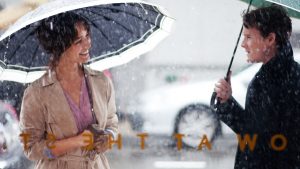5 to 7 Charms at the DCJFF’s Fall Screening
As part of the Washington, D.C. Jewish Film Festival Fall Season Lineup (an expansion of the robust Film Festival), the Edlavitch Jewish Community Center hosted a screening of the romantic dramedy, 5 to 7, on Tuesday, September 20th. The DCJFF, now headed into its 27th year, usually runs in late winter/early spring but will be moving to May starting in 2017. It is one of the largest and most respected Jewish film festivals in North America and features an international exhibition of cinema that celebrates the diversity of Jewish history, culture, and experience through the moving image. The films and programs presented are truly as diverse as the Jewish experience. In addition to the main festival, there is also an ongoing, year-round film series, including now in the Fall months, with such films such as 5 to 7. The festival serves over 15,000 people with more than 80 screenings annually, nearly all of which are regional, US or world premieres. Most screenings are followed by discussions with guest filmmakers and subject matter experts. Also coming in October as part of this supplemental season is Seret DC, which features a diverse group of films and programs from Israel that represent contemporary Israeli life, including recent Ophir Best Picture winner Sand Storm, about Bedouin women in Southern Israel.
5 to 7, which premiered last year, is directed by Victor Levin and concerns itself with a 5 to 7 relationship between a young American man who is a budding writer and a slightly older French woman who has a husband and children. What is a 5 to 7 relationship you ask? Well, it is a French invention for sanctioned extramarital affairs since those hours of the day are often unaccounted for and for which a person could slip out of work or domestic obligations relatively unnoticed. Still following? Despite the film’s unconventional premise, the story at its core is a sweet and charming tale of twenty first century love in the big city.
The film is beautiful to look at and cinematographer Arnaud Potier presents New York in a gorgeous and romanticized sheen reminiscent of Woody Allen’s earlier films. The Manhattan in this film is a beauty and there are indeed many stunning sequences and shots. The screenplay (written by Levin) is sharp and witty and the film has some truly hilarious moments as well as some sweet and sentimental ones. Levin does a great job balancing the funny, melancholy, and charming moments, all of which are in great supply. It certainly helps to have talented and engaging leads such as Marlohe and Yelchin. I would be remiss if I didn’t acknowledge that Yelchin’s untimely death earlier this year seems to loom over the film as a devastating spectre that adds an another layer of poignancy to the story. Indeed, the film is a sad reminder of his talent cut short and his potential that will never be fully realized.
In many ways the film is similar to Woody Allen’s oeuvre, particularly as it functions as a love letter to New York and it concerns itself with a Jewish New York-based man who falls for a gentile woman who is very much a transplant. However, the film’s Jewish content and by extension, Brian’s Jewishness is marginal. There is one scene where he attempts to explain Passover and matzah to Arielle, to no avail. Having said that, Brian’s parents (played by the perfectly cast Glenn Close and Frank Langella) are on hand and supply the laughs and ample Jewish humor, stereotypes notwithstanding. Overall, the film strikes a good balance between humor and sentimentality and is worth a closer look during the hours of 5 to 7 or really at any time of day.
